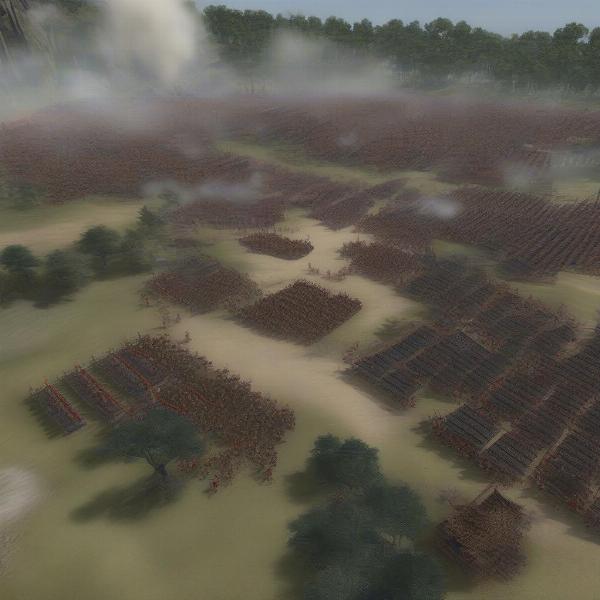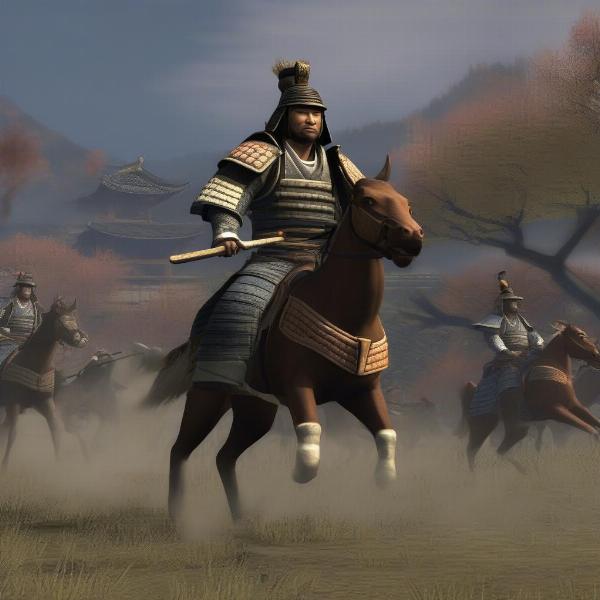The question, “Shogun 2 Was The Last Good Total War Game,” echoes frequently throughout online gaming forums. While subjective, this sentiment highlights a perceived decline in quality within the Total War series since the release of Shogun 2. But was it really the last great Total War? Let’s delve into the arguments and explore why this opinion persists, examining both the merits of Shogun 2 and the perceived shortcomings of its successors.
Shogun 2: A Masterpiece of Strategy and Atmosphere
Shogun 2: Total War, released in 2011, captivated players with its refined mechanics, immersive setting, and compelling campaign. The game perfectly blended real-time tactical battles with intricate turn-based strategic management. Its feudal Japan setting provided a rich tapestry of unique units, factions, and cultural nuances, creating a truly unforgettable experience.
The game’s strength lay in its well-balanced gameplay. Diplomacy felt meaningful, battles were challenging yet rewarding, and the campaign offered a satisfying level of strategic depth. The focus on clan warfare, honor, and political maneuvering resonated deeply with players, creating a sense of immersion unmatched by subsequent titles. Many felt the later games diluted this core experience, prioritizing expansion and adding features that, in their opinion, detracted from the core gameplay loop.
What Made Shogun 2 So Special?
- Exceptional Unit Variety: Each clan possessed distinct units with unique strengths and weaknesses, encouraging diverse strategies and preventing any single approach from dominating.
- Challenging yet Rewarding Battles: Battles demanded strategic thinking and tactical prowess, rewarding careful planning and skillful execution.
- Meaningful Diplomacy: Alliances, betrayals, and shifting political landscapes were integral parts of the campaign, adding depth and complexity.
- Immersive Setting and Atmosphere: The meticulous detail in recreating feudal Japan’s culture, aesthetics, and warfare created a truly captivating world.
- Strong Campaign Map: The strategic map felt intricately designed, rewarding exploration and strategic planning.
 Shogun 2: Total War – A Landmark in Strategy Gaming
Shogun 2: Total War – A Landmark in Strategy Gaming
The Decline? Exploring Post-Shogun 2 Total War Games
The years following Shogun 2’s release saw the Total War franchise expand into various historical periods and fictional settings. While some entries, like Attila and Warhammer, found considerable success, many players felt these titles sacrificed the refined gameplay and focused experience of Shogun 2 in favor of larger scopes and added complexities that, often, felt bloated and less satisfying.
Did Total War Lose its Way? A Critical Look at Later Entries
Many argue that subsequent Total War games attempted to do too much, diluting the core strategic experience with overly complicated mechanics and less focused campaigns. The addition of numerous factions, units, and features, while seemingly expanding the options, often led to a feeling of overwhelming complexity and a decrease in the individual impact of player choices. The “one-size-fits-all” approach often left the games feeling less unique and less memorable.
Why Players Feel Shogun 2 Stands Apart
- Focus and Polish: Shogun 2 felt polished and refined, with a clear emphasis on the core gameplay loop. Later games, in contrast, often felt sprawling and less focused.
- Balance and Challenge: The balance of power in Shogun 2 was arguably superior to later entries, leading to more competitive and engaging gameplay.
- Uniqueness of Setting: Feudal Japan provided a historically unique and captivating setting for a strategy game.
- Modding Community: The robust modding community expanded Shogun 2’s lifespan and added even more replayability.
 The Enduring Legacy of Shogun 2: A Comparative Look at Total War Games
The Enduring Legacy of Shogun 2: A Comparative Look at Total War Games
What Made Shogun 2’s Campaign so Engaging?
“Shogun 2 provided a level of strategic depth that’s been lacking in subsequent titles,” says Dr. Anya Sharma, a renowned game design professor at the University of Cambridge. “The interconnectedness of the political and military systems made every decision meaningful, leading to a truly immersive experience.”
Another expert, Professor Kenji Tanaka, a historian specializing in feudal Japan, adds, “Shogun 2’s success lies in its nuanced portrayal of the social and political dynamics of feudal Japan. It wasn’t just a game of conquest; it was a game of strategy, intrigue, and careful negotiation.”
This attention to detail is often cited as a major factor contributing to Shogun 2’s enduring legacy. The game didn’t simply present a historical setting; it incorporated the historical intricacies into the very core of its gameplay. Later entries, even those set in equally rich historical periods, haven’t quite replicated this level of immersion.
 Analyzing Total War's Evolution: A Deep Dive into Gameplay Changes
Analyzing Total War's Evolution: A Deep Dive into Gameplay Changes
Beyond Shogun 2: The Evolution of the Total War Franchise
Despite the nostalgia surrounding Shogun 2, it’s crucial to acknowledge the evolution of the Total War franchise. Later games incorporated improved graphics, larger scales, and more complex mechanics. The Warhammer series, in particular, introduced fantastical elements that captivated a new audience. The question isn’t solely whether Shogun 2 was the last good Total War game, but whether its specific qualities have been successfully replicated or surpassed in later iterations.
However, many gamers still yearn for that specific blend of focused strategy, well-balanced mechanics, and an immersive setting that defined Shogun 2. The call for a return to the core principles that made Shogun 2 so captivating continues to resonate within the Total War community. This desire speaks volumes about the game’s enduring impact and its place in the history of strategy gaming.
Frequently Asked Questions (FAQs)
Q1: What makes Shogun 2’s gameplay so compelling compared to later games? A1: Many cite Shogun 2’s refined mechanics, well-balanced factions, and the immersive setting of feudal Japan as key elements that contributed to its enduring appeal. Later titles often tried to introduce too many mechanics, leading to gameplay that felt bloated and less focused.
Q2: Is Shogun 2 still worth playing in 2024? A2: Absolutely! Despite its age, Shogun 2 remains a highly enjoyable and challenging strategy game. Its active modding community ensures continued longevity and provides plenty of content to keep players engaged.
Q3: What are the major differences between Shogun 2 and other Total War games? A3: The key differences often lie in scale, scope, and focus. Shogun 2 prioritized a refined and balanced core gameplay loop, while later games often aimed for greater breadth and complexity, sometimes at the cost of depth.
Q4: What are some of the best mods for Shogun 2? A4: There are countless great mods for Shogun 2, enhancing the game in various ways. Popular choices include those that expand the campaign map, add new units and factions, or tweak gameplay mechanics for a better balance.
Q5: How does the AI in Shogun 2 compare to later titles? A5: The AI in Shogun 2 is often praised for its challenge and strategic competence. While later titles have improved AI, many still feel Shogun 2 maintained an excellent balance of difficulty and predictability.
Q6: Why do so many players consider Shogun 2 the best Total War game? A6: A combination of factors, including its polished mechanics, well-balanced gameplay, immersive setting, and strong modding community, have contributed to Shogun 2’s enduring popularity and status as many players’ favorite in the Total War franchise.
Q7: What are the chances of a Shogun 3? A7: While there’s no official announcement of Shogun 3, the enduring popularity of Shogun 2 suggests that a sequel is always a possibility.
Let us know your thoughts! Do you agree that Shogun 2 was the last truly great Total War game, or do you believe a later title has surpassed it? Share your opinions in the comments below!

